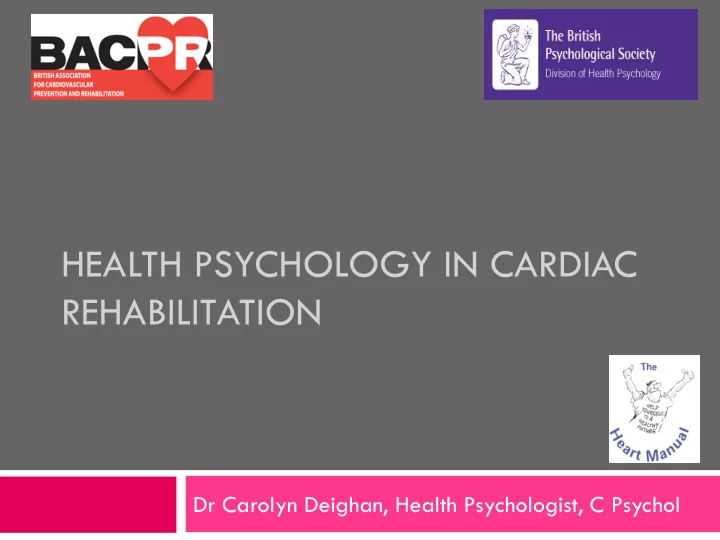

HEALTH PSYCHOLOGY IN CARDIAC REHABILITATION Dr Carolyn Deighan, Health Psychologist, C Psychol
British Association for Cardiovascular Prevention and Rehabilitation – elected Council Member- (representing Psychology and Scotland). British Psychology Society Division of Health Psychology Scotland Committee -Consultations Representative. Health Psychologist, Heart Manual Service, NHS Lothian.
Aims Highlight the role of health psychology in cardiac rehabilitation. Clarify what health psychologists do and what they offer to cardiac rehabilitation. Offer examples of evidenced interventions/tools in CR using psychological theory and methods.
Cardiac rehabilitation needs Whilst physical activity in cardiac rehabilitation is well established, the Scottish Government’s CR clinical champion highlighted the perceived need for a greater focus on behaviour change and psychological support (CPG Sept 2017).
Health Behaviour Change CP&R services should ensure: Health behaviour change interventions /key behaviour change techniques /up-to-date psychological evidence-base. Training-communication skills for all staff e.g., motivational interviewing techniques/relapse prevention strategies. Information and education - fully informed choice & menu of evidence-based programme components. Address cardiac or other misconceptions - illness perceptions that lead to increased disability and distress. Regular follow up /assess feedback /further goal setting .
What is Health Psychology? Division of Health Psychology Scotland
Health Psychologists… Source: 'The Application of Behavioural Science to Public Health' webinar by Public Health England and the Health Psychology in Public Health Network 24/07/17 Division of Health Psychology Scotland
Psychology Focuses on thoughts, emotions and behaviour and their interactions Thoughts What we think Health Psychology Aims to understand and change thoughts, emotions and behavior and their interactions in the context of Behaviour Emotions health, illness and healthcare What we do What we feel Division of Health Psychology Scotland
Understanding and changing thoughts, emotions and behaviours in: Across the lifespan e.g. help people lose weight and maintain weight Health loss, stop smoking, take more exercise, attend cervical screening, wear sunscreen, see a dentist e.g. supporting people to better manage chronic Illness conditions, interpret symptoms, adhere to medication, manage pain, attend follow up e.g. helping health professionals to adhere to Healthcare clinical guidelines, develop skills to change patient behaviour, engage in hand hygiene Division of Health Psychology Scotland
Physical Health Health Psychology Behavioural Medicine Psychology Medicine Clinical Psychology Psychiatry Mental Health Adapted from Kaptein & Weinman, 2004 Division of Health Psychology Scotland
Health psychology informed competences to change lifestyle behaviours Health psychology informed HBC Also informed specific CR framework competences
Psychosocial health All patients should undergo a valid assessment of: - Psychological distress , for example, anxiety and depression (using an appropriate tool – Hospital Anxiety and Depression Scale (HADS). Living With Heart Failure (MLWHF). - Psychological stressors. - Illness perceptions and self-efficacy for health behaviour change. Help to increase awareness of ways in which psychological development, including illness perceptions, stress awareness and improved stress management skills can affect subsequent physical and emotional health.
Key concerns – thoughts and emotions Cognitive reaction – how people think about their cardiac condition/event, what they believe. Emotional reaction- how people react emotionally to their experience. How the above shapes how people cope mentally and physically to their cardiac/condition/event.
“I have found the “My confidence relaxation exercises “I am less has improved and I Feeling bad Poor sleep Loss of helpful in initially agitated” tempered am getting stronger patterns confidence getting to sleep, and each day” […] if I wake in the night” “I have a “If I get an Lack of interest better outlook irritated feeling Feeling in what life has “Helped me irritable on life” I now walk to offer Worrying understand the away.” thoughts “Turning question – negative why me?” Low thoughts into mood positive ones!” “I wasn’t overloaded with facts when “I take life Poor “Restored my love Lack of Always adjusting to lower slower – most of concentration exercise for exercise” rushing concentration the time!” levels”
Interventions/tools using health psychology (some examples) Illness Perception Questionnaire (IPQ) (Weinman et al) predictive of CR attendance, psychosocial functioning post MI). The Heart Manual programme “Within home -based CR programmes, behaviour-change techniques, such as social support and goal setting were shown to be effective in reducing CVD risk factors, with comparable results to hospital- or centre- based programmes” 1++ (SIGN 150:p14) . Motivational Interviewing (Rollnick et al) increasing motivation for health behaviour-change. NHS Education :MAP Behaviour Change eLearning (for health and social care staff). Cardiac Rehabilitation!
Summary Health behaviour change (HBC) integral to six components of cardiac rehabilitation. Health psychologists are specialised in HBC to help patients directly, or devise interventions and train others in HBC. Anxiety and low mood are common reactions that without timely support can lead to more severe levels. Health psychologists can play a crucial part in supporting individuals cope mentally and emotionally with their cardiac event/condition in order to avoid clinical levels of distress that warrant more intensive therapy.
Further Information British Psychological Society Division of Health Psychology Scotland www.bps.org.uk/dhpscotland
www.bacpr.com carolyn.deighan@nhs.net www.theheartmanual.com
Recommend
More recommend